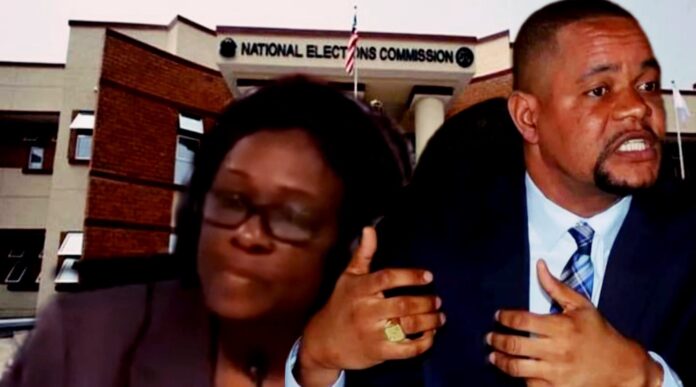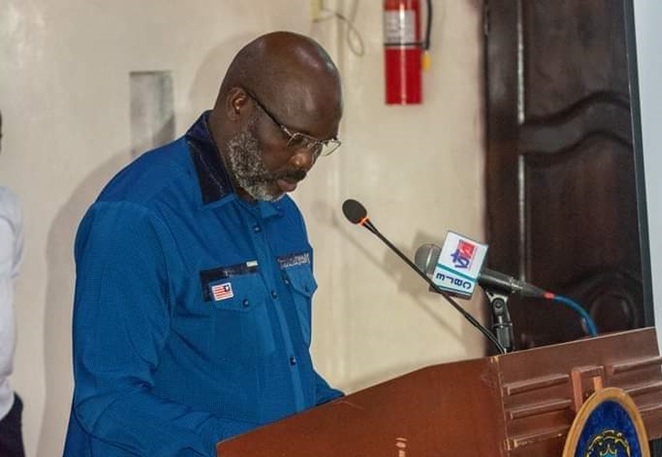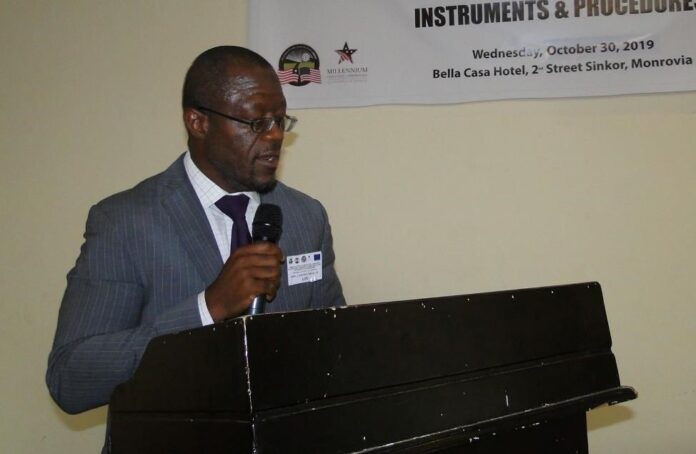By Olando Testimony Zeongar
MONROVIA – Disagreement has ensued between the National Elections Commission (NEC) and loquacious political commentator Henry Pedro Costa, over the outcome of phase one of the maiden edition of Liberia’s Biometric Voter Registration (BVR) exercise.
While the NEC is hailing Liberians for their interest and support to the electoral body’s field staff, as well as for the diligence of the Commission’s staff during phase-one of the BVR process conducted in six counties; Montserrado, Margibi, Grand Bassa, Gbarpolu, Bomi and Grand Cape Mount that came to an end on 9 April, as being successful and a one that recorded high turnout, Costa claims the first phase of the exercise was a disaster.
A day after the NEC through its Chairperson Madam Davidetta Brown-Lansanah announced at the Commission’s 9th Street Sinkor Headquarters, in Monrovia that out of the total of 1.4 million registrants in the BVR phase-one, 711,410 are females, while 723,799 are males, Costa, at a press conference, asserted that the first phase of the Biometric Voter Registration exercise was flawed.
“The first phase of the Biometric Voter Registration exercise was a disaster,” said Costa, who accused the NEC of failing to deliver on its mandate to provide a fair, transparent and efficient Voter Registration process.
“We saw numerous system failures including malfunctioning biometric machines and a lack of properly trained staff,” recalled Costa, who added that the outcome of the allegedly flawed phase-one of the BVR exercise is already evident in the low turnout of individuals eligible to register to be able to vote on October 10, 2023, particularly in areas where he claimed these failures were most pronounced.
He claims signs of voter suppression were also evident during the first phase of the BVR, disclosing that reports have emerged of individuals being turned away from registration centers based on what he termed flimsy reasons.
He argued that the time allotted to conduct the first phase of the Voter Registration exercise, especially in the most populous county of Montserrado was very insufficient.
Also, Costa noted that there was the issue of inaccessibility of registration centers, which he claimed saw far too many people having to travel long distances, especially in the rural areas often times, only to be told after they had made the long and hard journey, “The system is down.”
According to him, this is a clear attempt to disenfranchise certain segments of the population and undermine the country’s democratic process.
“This is unacceptable and considerably calls into question the integrity of the electoral process in Liberia,” Costa emphasized.
But, NEC chairperson Brown-Lansanah, while admitting that there were quite a few technical glitches during the first phase of the BVR process, debunked Costa’s assertion of reports of low turnout, stating that phase-one of the exercise recorded high turnout and that Liberians showed great interest in the conduct of the Biometric Voter Registration exercise in the country.
“As with the introduction of every technology, it is not unusual for glitches and other challenges at the initial stages of using new machines to conduct the process, and we had quite a few,” said Madam Brown-Lansanah, who reported that preliminary results from phase-one of the BVR exercise show that 891,201 voters registered in Montserrado, while 184,425 voters registered in Margibi, followed by Grand Cape Mount, where she said 89,589 voters were registered.
In Grand Bassa County, the NEC boss announced that 157,712 voters were registered, while Gbarpolu and Bomi witnessed 64,395 and 50,887 voters being registered respectively.
Howbeit, Costa, who expressed dissatisfaction over the composition of Commissioners of the NEC, indicating that he does not trust them, maintained that phase one of the BVR processes was flawed.
He described the process as being a fiasco, stating that what the NEC conducted is not a Biometric Voter Registration exercise, pointing out that a legitimate BVR exercise would not allow multiple registrations, as was seen during the first phase of the exercise in Liberia.
“The biometric system is supposed to prevent multiple registrations by one person. The whole idea about the biometric exercise is to ensure that your biometric data is in the system to prevent any unscrupulous person from registering more than once,” said Costa, who added, “But unfortunately, what you are witnessing here is not a Biometric Voter Registration exercise. It’s a fiasco.”
He chided the NEC for announcing that it was carrying out a “deduplication and adjudication” process of the current voter registration records from the six counties in phase one, aimed at removing all instances of multiple registrations and other data cleaning processes.
Costa wonders, “How can you say after conducting a supposedly Biometric Voter Registration exercise, then you go on to conduct a clean-up?”
He stressed that a Biometric Voter Registration exercise does not need a clean-up, according to him, because in a BVR process, no one person should be allowed to register more than once.
“So, this process is flawed because people were allowed to register more than once,” Costa reiterated, stating, “Nowhere in the world has any electoral body conducted a biometric voter registration exercise and then, later on, said they had to do a clean-up.”
He continued: “This was not a manual process, it’s biometric. Nobody should have been allowed to have registered twice, or three times. So, the fact that they are saying they are going to purge the data of multiple registrations, does not leave a real big doubt in your mind as to what the real number of actual legitimate voters are?”
He stated that once it’s biometric, immediately upon the conclusion of the exercise, the numbers should be constant, adding, “If the system was legitimate, if the system was not fraudulent, there should be no need for clean-up. Because no one person should have been able to register more than once.”
“The process was fraudulent because they have to clean up,” Costa insisted, wondering, “What kind of decent process requires a clean-up?”
He observed that by the NEC announcing a “deduplication and adjudication” process following phase one of the BVR exercise, it’s evidence that the process was fraudulent.
“They have to do cleansing, they have to sanitize it because some of those voters are not real. That’s the evidence right there. They have admitted to you the fraudulence that characterized the process, and that’s why we are saying, we don’t trust them,” he maintained.
In spite of Costa’s claims, NEC Chairperson Brown-Lansanah is warning Liberians 18 years and above, not to attempt registering multiple times, stating that doing so is a crime.
She noted that perpetrators of such crimes will be caught by the BVR system and turned over to the Ministry of Justice for prosecution.
Interestingly, Madam Brown-Lansanah averred that multiple registrants will be automatically deactivated by the BVR system, indicating that such individuals risk losing the opportunity to exercise their franchise on 10 October 2023, during the country’s general and presidential elections.
Costa, a tough-talking talk radio presenter, who was calm throughout the course of his Tuesday’s press conference, accused the NEC of allowing those he referred to as elements of the governing party, the CDC, of registering multiple times.
“There are elements of the CDC, who have been allowed to register more than once with the intent to vote more than once on Election Day. This process is not a biometric process. Which is why we in the opposition want to call on our leaders to engage with the National Elections Commission so that we can witness and participate in that so-called clean-up exercise, which should not be happening in the very first place. This was a scam of an effort, it was not a biometric effort,” Costa further emphasized.
However, NEC boss Madam Brown-Lansanah, on Monday, announced that the electoral body has opened its doors to all observers and stakeholders, including political party technicians that are duly accredited by the NEC to observe the deduplication and adjudication process, which has already begun at the Commission’s Data Center.
Meanwhile, Costa has made the call for an extension in the time for the conduct of the BVR exercise, according to him, to allow all eligible Liberians to register and enable them exercise what he called their God-given constitutionally guaranteed franchise in the all-important October 10, 2023 general and presidential elections.
Ahead of the commencement of phase-two of the BVR exercise, Costa is demanding that the NEC does what he referred to as a much better job.
“They must ensure that the exercise is conducted with fairness, transparency, and efficiency. They must take steps to address the system failures that plagued the first phase, and put in place measures to prevent voter suppression,” Costa insisted.
But, the Commission has disclosed that in order to address potential glitches in phase-two, on 13 April, it held a one-day internal lessons learnt workshop to understand the challenges that were encountered in the first phase.
The NEC says, having identified the root causes of the phase-one challenges, which include improper connection and powering of the equipment, BVR centers ownership, timing of meal allowance payment, logistics, etc., the Commission is taking remedial actions to better the second phase.







